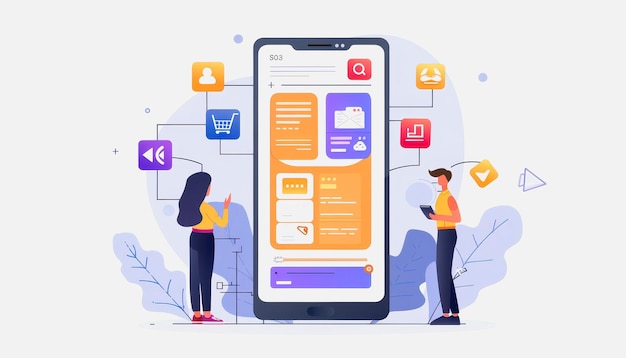In today’s fast-paced digital landscape, financial management has taken a transformative leap. Gone are the days of traditional banking and financial systems. The future of money management is undeniably linked to mobile app development. With the widespread use of smartphones, the demand for mobile financial applications is skyrocketing, and it is transforming how individuals and businesses handle money. This article explores why mobile app development is key to financial success in the modern world, highlighting the essential role it plays in enhancing financial inclusion, accessibility, security, and innovation.
What is Mobile App Development for Financial Services?
Mobile app development for financial services refers to the creation of mobile applications that enable users to perform financial activities such as banking, budgeting, investing, and payments via their smartphones. These apps are tailored to streamline financial tasks, making them accessible, efficient, and user-friendly. From personal finance management to complex trading platforms, mobile apps are revolutionizing how financial services are delivered.
Key Features of Financial Mobile Apps
- Ease of Access: Users can manage their finances anywhere, anytime.
- Real-Time Data: Mobile apps provide users with real-time information about their finances, investments, and transactions.
- Security: With advanced encryption and biometric authentication, mobile financial apps are designed with cutting-edge security measures.
- Personalization: Financial apps can be tailored to individual preferences, providing customized experiences.
- Automation: Features such as automatic payments, budget tracking, and savings plans simplify financial management.
Why Mobile App Development is Crucial for Financial Success
1. Increased Accessibility and Convenience
One of the most significant reasons why mobile application development is pivotal for financial success is accessibility. Mobile apps eliminate the need to visit physical branches or interact with traditional banking systems. With mobile financial apps, users can access their accounts, make transactions, or monitor their spending from anywhere in the world. This accessibility empowers people to take control of their finances at their convenience.
Furthermore, mobile apps offer 24/7 services. Whether you need to transfer money at midnight or check your credit score while traveling, financial apps provide continuous access without any time or location constraints. This convenience has contributed to the increasing adoption of mobile banking and payment services.
2. Enhanced Financial Inclusion
Mobile app development is driving financial inclusion globally, especially in regions with limited access to traditional banking services. According to the Global Findex report by the World Bank, more than 1.7 billion people are unbanked, but nearly two-thirds of them own a mobile phone. Mobile apps present an opportunity for these individuals to participate in the financial ecosystem by offering easy access to financial services.
For instance, mobile payment platforms like M-Pesa in Africa and digital wallets such as Paytm in India have empowered millions of unbanked individuals by providing financial services without the need for a physical bank account. Mobile apps are bridging the gap between traditional financial institutions and the underserved population.
3. Improved Customer Experience
In the competitive financial industry, customer experience is crucial. Mobile app development allows financial institutions to offer a more personalized and seamless experience to their users. By utilizing data analytics and artificial intelligence (AI), financial apps can provide customized recommendations, tailored financial products, and proactive financial advice based on user behavior.
Moreover, mobile apps streamline complex processes, making it easier for users to navigate and complete transactions. Tasks like loan applications, investment tracking, and bill payments are simplified, making the entire experience smooth and user-friendly. Satisfied customers are more likely to trust and stick with a financial brand, contributing to long-term financial success for both users and financial institutions.
4. Real-Time Data and Financial Insights
Mobile financial apps provide real-time updates and insights, which are essential for effective money management. Users can track their spending habits, monitor investments, and analyze financial data in real-time, which aids in making informed decisions. For businesses, having access to real-time financial data helps in budgeting, forecasting, and adjusting strategies quickly in response to market fluctuations.
For instance, budgeting apps like Mint and investment apps like Robinhood offer real-time data on your financial status, ensuring you’re always in control of your finances. With access to real-time data, users are better equipped to make decisions that contribute to financial growth and success.
5. Security and Fraud Prevention
As financial activities shift to mobile platforms, security becomes a top priority. Mobile app developers are implementing cutting-edge technologies to ensure that user data is protected. Encryption protocols, two-factor authentication (2FA), biometric verification, and secure sockets layer (SSL) technology are just a few security measures used in mobile financial apps to safeguard sensitive data.
Additionally, mobile apps help in fraud prevention by sending instant notifications of transactions. If suspicious activity is detected, users can immediately take action, such as freezing accounts or reporting the activity. This level of security enhances user trust and protects financial assets, making mobile apps a safe choice for money management.
6. Streamlined Payments and Transactions
Mobile apps make payments and transactions easier than ever before. Whether it’s paying bills, sending money to friends, or making purchases online, mobile apps offer a seamless transaction experience. With the rise of contactless payments and digital wallets like Apple Pay, Google Pay, and PayPal, mobile apps are playing a central role in reshaping the way we pay for goods and services.
The convenience of managing all financial transactions in one place simplifies money management and reduces the reliance on physical cash or cards. This shift towards digital payments is crucial for staying ahead in a cashless society, promoting financial success in the long term.
The Role of Mobile App Development in Business Financial Success
1. Cost-Effective Financial Solutions
For businesses, mobile apps offer a cost-effective way to handle finances. By developing in-house financial apps or using third-party solutions, businesses can cut down on transaction fees, streamline payroll, and automate accounting processes. This cost efficiency leads to higher profitability and better financial management.
For example, many small businesses use mobile accounting apps like QuickBooks or Xero to manage expenses, send invoices, and track payments. These apps help business owners save time and reduce the need for costly third-party financial services.
2. Investment and Wealth Management
Mobile apps have democratized investment opportunities. Financial apps like Acorns, Robinhood, and Stash enable users to invest small amounts of money in the stock market, without the need for a financial advisor or brokerage firm. This has opened up investment opportunities to a broader audience, allowing people to grow their wealth over time.
For businesses, mobile investment apps offer a platform to manage portfolios, track market trends, and adjust investment strategies in real-time. This ease of access to wealth management tools plays a key role in financial success, both for individuals and businesses.
3. Future Trends in Mobile App Development for Financial Services
As technology advances, the future of mobile app development for financial services will see several innovations that will further revolutionize money management. Here are some key trends to look out for:
- AI and Machine Learning: These technologies will enable more personalized financial advice, fraud detection, and predictive analytics.
- Blockchain Technology: The decentralized nature of blockchain will enhance the security of financial transactions and reduce intermediaries.
- Voice-Assisted Banking: The rise of voice assistants like Siri and Alexa will lead to voice-enabled banking and financial management.
- Augmented Reality (AR): AR could be used in mobile financial apps for visualizing data and offering more interactive experiences for users.
Conclusion: Mobile App Development – The Key to Financial Success
Mobile app development is shaping the future of money management in profound ways. From increasing financial inclusion to enhancing security, improving customer experiences, and providing real-time financial insights, mobile financial apps are becoming indispensable tools for both individuals and businesses. As we move towards a more digital economy, investing in mobile app development is crucial for achieving long-term financial success.
In conclusion, embracing mobile app development will not only streamline financial operations but also pave the way for innovative solutions that contribute to financial growth. Whether you’re an individual looking to manage your personal finances or a business seeking cost-effective solutions, mobile financial apps are the key to staying ahead in an increasingly digital world.






Comments